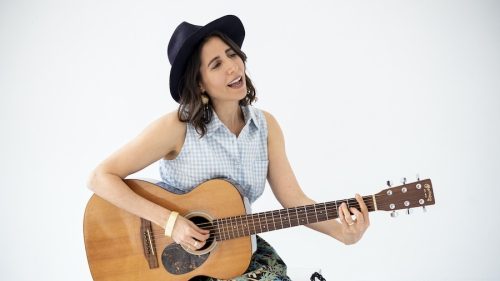
“When we sing, we express more emotionally and less intellectually,” says Music Therapy alum Vered Benhorin, who is a leader in the world of music for babies.
Benhorin’s unique classes, which combine music, therapy, and a sense of community, are popular with new parents.
In her Baby in Tune classes, parents sing songs to their babies, most of which were written by Benhorin, and learn ways to connect with their babies and to each other while embodying their new identities as parents. She facilitates the conversation, asking thoughtful questions, helping participants help each other, and sharing what worked for her with her own three children. The parents talk about their parenting struggles candidly, such as difficult nights, exhaustion, toddler tantrums, anxiety about returning to work after maternity leave, and how their relationship with their partner has changed, as well as their "parenting wins" and accomplishments.
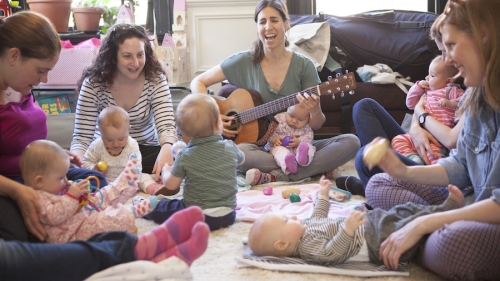
“Although I help parents be better parents now, motherhood didn't come easily to me. I was already a music therapist, working with various populations, and I was studying toward a PhD in clinical psychology,” Benhorin remembered.
“I had big plans and having a baby threw me off. During those first months, I was sleep deprived, hormonal, frustrated, and in physical pain. I wasn't feeling connected to my baby. And despite being a musician, I hadn't sung a note. When I finally did, I felt more connected to him than I ever had. It was the way he looked up at me and how I felt more relaxed and emotional, not bogged down by my endless to-do list and all the 'shoulds' around parenting. Music was my way into motherhood. Once I realized that, I wanted to share it with others.”
When Benhorin was a new mom, she began by writing little snippets based on how she was feeling and then developed them into songs.
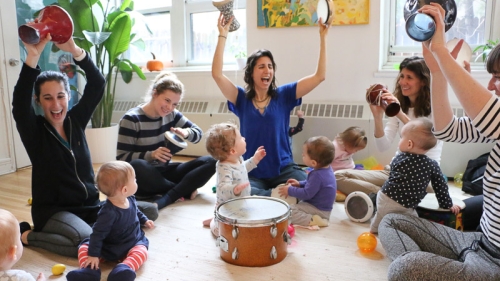
Her own favorite song is "Something Other Than a Mom." “It is a song that seemed to spill out of me about the identity crisis that I was having, and I think many parents have, when they have a baby. I remember crying as I wrote it,” she recalls.
Benhorin’s three albums are available on Spotify, iTunes, Amazon, and YouTube, and her song “All I Want,” a song about a parent simply wanting more sleep, is her most listened to and shared song.
Benhorin has developed two modules of classes ranging from newborns to 2.5-year-olds, tailoring her lessons to the group. Until the pandemic hit last spring, Benhorin’s Baby in Tune classes were taught in small groups in Brooklyn. Parents and their babies would gather in a circle on the floor while Benhorin would weave around them. Since this format would no longer work, she, like almost everyone else, turned to Zoom.
“The pandemic completely changed my business model,” she said. “Until COVID, I relied mostly on word of mouth. The business was flourishing to the point where I had just trained five new instructors and had hired two business managers. Once the classes moved to remote I had to shift to attracting a new audience through social media. I started posting on Instagram daily with tips that would be valuable for caregivers. Making daily videos forced me to crystallize the value I can give to parents.”
She went on, “When COVID forced us to move all the classes to Zoom, I was thrilled to find out that the classes are still enjoyable, meaningful, educational, and therapeutic for parents.” Parents from all over the country were able to participate together. In one recent class, a mother from New York invited her friend to join the class from Atlanta, Georgia, something they wouldn't have been able to do in person.
Music was my way into motherhood. Once I realized that, I wanted to share it with others.
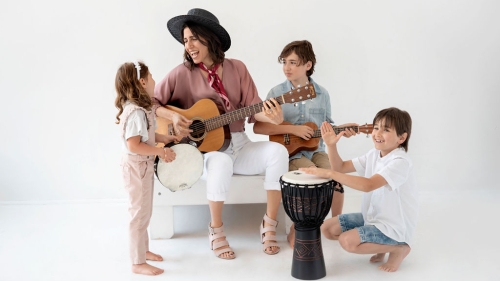
Benhorin, who trains others in her Baby in Tune methodology, was then able to teach instructors all over the world. “I've done successful trainings with people from Greece, Finland, Israel, Canada, and throughout the US. I truly enjoy doing the trainings and am excited to continue to develop this direction moving forward,” she noted.
Benhorin answered a few questions by email about choosing to study at NYU’s Music Therapy program and how music can help parents.
Why did you choose to study Music Therapy at NYU?
After getting my BA at Gallatin, I spent a few years doing distinctly New York odd jobs – working at Blue Man Group Tubes, working as a tour guide at the UN, working as a graphic designer on Wall Street, and teaching music to kids. I applied to NYU's Music Therapy program because it seemed like a natural step for me. I had always been interested in psychology (both my parents were in the field), I was a recording musician, and I was eager to find a way to blend my interests and turn them into a career.
I looked into various programs but was happy to find that the program at NYU felt like the best fit. I admired the work of the faculty, especially people like Ken Aigen, Alan Turry, Diane Austin, Noah Shapiro, Joanne Loewy, Barbara Hesser, and others. I also appreciated that the program at NYU was a master’s program not a bachelor’s program (as many music therapy programs are).
How has your NYU degree helped you in your career?
First I got a BA in philosophy and music from Gallatin. I went into Gallatin thinking I would do fine art, but through my exploration I found music. Once I graduated with my BA, I started writing, recording, and performing with musicians I had met in the program (two of which are still in my band!). My degree in Music Therapy set me on my professional way. It also helped solidify my belief that music is therapeutic and opened my eyes to the various settings in which it could be used. (I went on to work in psychiatric, addiction, and pediatric settings.) It also taught me techniques and theory that I use every day in my practice with caregivers now.
The program introduced me to Jon Samson, a colleague in the program, who later produced two of my three albums for families.
How can adding songs into your baby's day help build a better routine?
Music is magic for this. Think about the preschool teacher who sings the clean-up song and all the kids start to clean up like robots. Music works the same way with babies. It helps them prepare for and anticipate an activity, like going to sleep or getting in the bath. It induces a physical reaction, like yawning or rubbing eyes, once the babies become acquainted with the song.
Music can be used as a timekeeper, for instance, during diaper changing or when preparing food, to help babies understand that there is an end to the waiting or discomfort.
Tell me about using music to talk to your baby and rhythm to distract/ calm your baby.
Babies love rhythm. We all do! It helps us feel in sync with others, regulates our heart beat, increases focus, and can be calming for all of those reasons. In our classes, parents learn how to use rhythm during their day to get through a moment of fussiness or boredom and bring their baby to a state of calm and focus. Parents learn how to interact with their baby not only through speech and singing but by using rhythm and dynamics.
As babies become more mobile, rhythm and drumming have been shown to increase language acquisition by teaching babies syncopation. We teach parents simple rhythm patterns so they can play music with their baby at home.
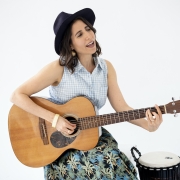
My degree in Music Therapy set me on my professional way. It also helped solidify my belief that music is therapeutic and opened my eyes to the various settings in which it could be used.
